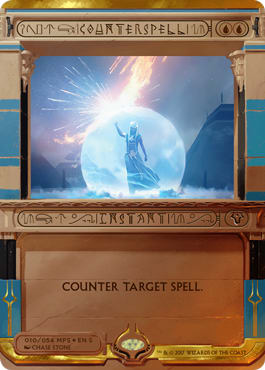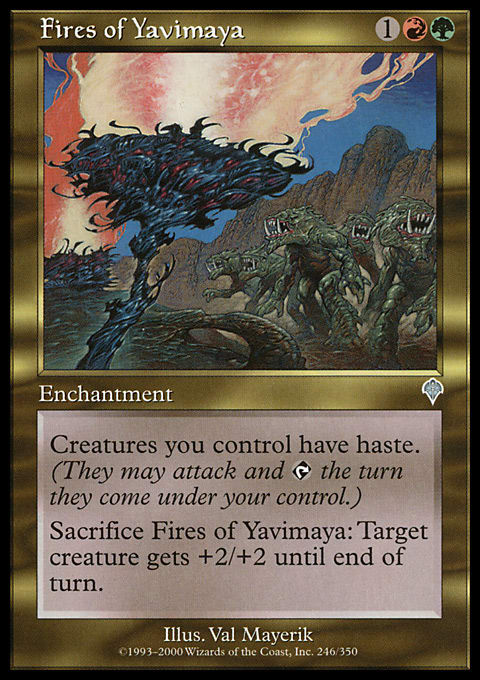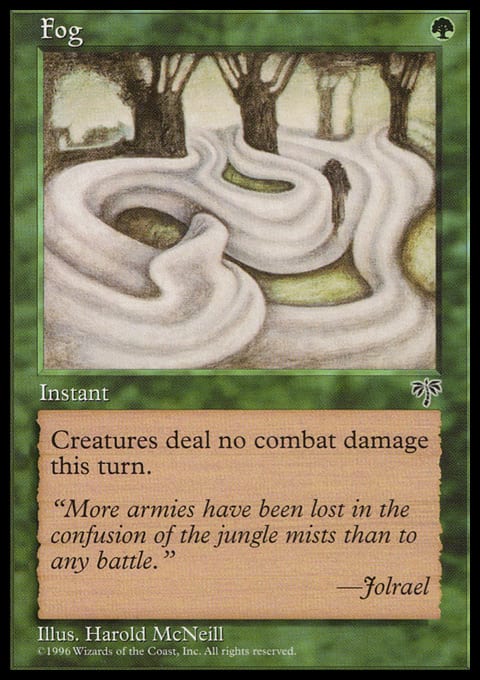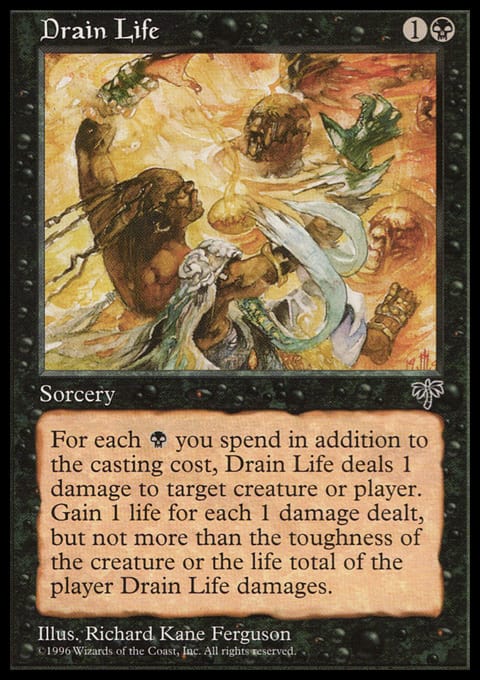Adrian Sullivan's excellent article of late discussed making the right play when filtered through your own play. He suggested eight skills to evaluate:
- Card Valuation
- Pacing
- Combat
- Counterspell Wars
- Life Management
- Bluffing
- Strategic Planning
- Mental Stamina
I covered the first three last time, so this article covers the rest. These skills translate across formats, so figuring out your strengths and weaknesses while avoiding common myths will help you wherever you find yourself.
Counterspell Wars
The Myth: Avoiding overextension is mainly about keeping enough cards in hand to bluff.
The Reality: Avoiding overextension is mainly about forcing opponents to respond to the fewest number of cards from your hand.
For multiplayer purposes, I'm going to broaden this one into Stack Wars, as both skills are about handling a bunch of things, many of which are hidden information, at once. For counterspells, I'm good as long as my issues with pacing don't get to me. I was taught Magic by a dyed-in-the-Psychatog control lover, so in order to win, I had to learn at least a little about slowing a plan down, baiting counterspells, and applying just enough pressure to force responses without overextending. Sometimes, my decks have terrible matchups against control, but I've won enough against permission to feel above-average on it, especially since I started playing when Counterspell was in Standard.
In multiplayer, there tend to be more Day of Judgments, Doom Blades, and Krosan Grips than Counterspells, but playing around them is similar. If casting an extra artifact won't improve your board much and someone's been playing as though he or she is holding Austere Command, don't cast the artifact. Let your other opponents apply enough pressure on the Austere Command player; you don't have to bait it out yourself. My Xira Arien Commander deck doesn't pack many answers, but it also doesn't put many nonland permanents out either, meaning opponents tend to spend their removal on each other instead of me. When you're trying to bait counterspells or sweepers so you can proceed with your plan, your goal is to play just enough stuff to get them to push the button. If the battlefield is such that you think the player with the answer will use it soon, don't put more things in the line of fire; focus on defending yourself so that whatever threat exists won't kill you. Not every deck concept has the opportunity to do that, but that's the sort of skill that carries over from counterspell wars.
Life Management
The Myth: Only the last point matters.
The Reality: There isn't a rule.
Generally, players evolve from guarding their life totals at all costs to learning how it's a resource, sometimes stating things as bullishly as the myth above. But what matters most is understanding what you're buying time for, which is either for your deck to execute its plan or for finding an answer to the opposing plan. And in most scenarios, the way to increase your odds of either event is having more turns to draw more cards.
So life management is largely about thinking about turns left to live, factoring in the board, cards left in your opponent's hand, and the possibility the top-deck adds damage next turn. My best friend Nathan has a Hazezon Tamar Commander deck that makes life management near-impossible. You know when the Sand Warriors are coming, but you don't know if Nathan's hand has a Fires of Yavimaya, Hammer of Purphoros, Flame-Kin Zealot, and/or Beastmaster Ascension to intensify the damage out of nowhere. Once Hazezon Tamar is cast, you have to manage your life like you're a turn away from death, no matter what's on the board.
Usually, and thankfully, life management is simpler than that. Think about how a 6-power commander represents a four-turn clock, whereas a 7-power commander can kill in three swings. All damage is sort of like that. Learn to convert your life total into a different number, Turns Left to Live, and you're most of the way to good life management.
Regular multiplayer usually doesn't provide enough life to practice good management—there are too many threats to feel certain about much—but duels, with one opponent, and Commander, with 40 life, both give enough leeway to learn to manage your life total. I think I'm decent on this skill. I sometimes block a turn too early, but otherwise, I have a good handle on Turns Left to Live versus Turns Before I Kill My Opponent, which is what life (total) is all about.
Bluffing
The Myth: Magic bluffing is like bluffing in more famous card games.
The Reality: TCGs have their own bluffs to learn.
There are a few players who can read me well, and they have very good records against me. I haven't asked anyone, but I don't appear to be awful at bluffing. My main weakness is that I can't seem to figure out where to look when I'm attacking and hoping my opponent doesn't do a certain thing—I have yet to keep my body language similar there. No one's ever told me he or she has noticed, but if any such person reads this article, now he or she knows.
I'm reasonable at two main bluffs: underselling my competence and not drawing attention to an opponent's line of play. If I'm facing an opponent who thinks he or she is all that, I'll let that arrogance kill the person in the end. I certainly have enough nervousness in a lot of games to the point that it's completely honest to be candid in my nervous state, but if it has the bonus of puffing someone up, it's fine by me.
I've also won games by not taking some attacks or using some removal in a way that would remind a player of a winning line on the board. I was facing a Selesnya creature-vomit deck at Friday Night Magic not long ago with a U/R deck built around defenders and winning with either Doorkeeper or Dragonshift (Wall of Frost is my favorite Dragon). Very few of my defenders had any power, so there was no downside to swinging at me with everything, but after the first game, my opponent had the idea that combat was pointless until his sideboarded Mistcutter Hydras showed up. So until I had a plan to win, I needed to play in a way that let him keep thinking combat was pointless. Sometimes, that was passing the turn quickly enough that I didn't give my turn's worth of time for him to reconsider. I didn't need to say anything; I just needed him to keep sitting back.
I don't advocate lying; if someone lies when stakes are low (e.g. in a card game), that's every reason for me to believe he or she might do it at higher stakes, and I don't want to waste my time figuring that person out. That's not a bluff worth taking if you want people to trust you. Besides, saying, "I've got nothing," or, "I'm weak," when you still have cards in hand isn't likely to be true; I assume you built your deck with purpose, so that card does something.
Where TCGs have their own bluffing is through board states, giving you opportunity to shine a spotlight (Glaring Spotlight, presumably) away from your plan. My Bludgeon Brawl deck does this well. I often have Glint Hawk Idols and Thunder Totems and Origin Spellbombs equipping the same creature—say, Jor Kadeen, the Prevailer—and if I attack with him, my board might appear to have no blockers, even as all the Equipment are capable of unattaching and blocking. I'm not doing anything out of the ordinary with my permanent arrangement, but it creates an open secret. Magic is complicated enough that open secrets frequently exist, and if you determine that one exists, playing to that end will help you out.
Strategic Planning
The Myth: The top of my deck is random, so I can't plan on what I'll draw.
The Reality: If you've built your deck well, it usually has enough redundancy to the point that you can and should plan.
I might be below-average on this one. Anticipating my opponents' sequences beyond a turn usually takes me longer than normal game pace allows. However, I do succeed at knowing my own deck well, and my deck-building style normally goes for enough cross-synergies that I know where my remaining draws can take me.
Draft and Commander's singleton nature can make it tempting to assess the board based only on your hand, but having enough cards that do the same thing gives you a rough window of how long you need to draw answers. Part of the shtick in my Xira Arien Commander deck is that it has about a dozen Fog effects. That's enough that I’m very likely to be holding one, and if opponents know that, they don't swing at me. Having a critical mass of a given effect lets you use your library like an extra hand, letting you plan further than you could otherwise.
As far as in-game sequences, I can't offer much advice other than to be aware of each card's decay rate—how static or changing the card's value is with each passing turn you cast something else over it. If the skies are clear, maybe Hypnotic Specter is better to play before Necropotence, as Necropotence will be good any turn you cast it while the Specter's returns will diminish the longer you wait. Stuff like that can make a difference.
Mental Stamina
The Myth: You always know when you're tired.
The Reality: Games are fun, and you can become caught up in playing them before realizing your play is slipping.
Mental stamina is among the few categories Adrian elaborated on, and it was entirely in the tournament setting. At Grand Prix Seattle–Tacoma two years ago, I had to win my last round to make Day 2, and I already had played several close games. My Sealed deck was built almost entirely for speed, so I probably had played fewer minutes of Magic than some of my opponents. But it was also my first Grand Prix, so I wasn't used to playing this much hard Magic. For that matter, playing in a prerelease and judging another the same day can be draining; anything during which you have to be "on" for long periods of time will take a lot out of you.
But when that thing is fun, it's easy to overlook what you're missing. Three-hour Commander games can Drain Life and Consume Spirit, and before you know it, your body's out of mana to spend on X more games that night. In multiplayer, never forget that an early concession of a game you're unlikely to win might refresh you for the next game. It might make sense for you to bring an unfinished deck to game night so that you can have something to energize you Magic-wise while you sit out a game. Know what drains and/or frustrates you, make a plan for addressing it, and you'll be streets ahead of your opponents.
I rarely grow tired from multiplayer unless a game goes long. Tournament play can drain me easily, depending on the number of rounds, so I have to be more careful there. Overall, I consider my mental stamina to be above-average, but that might only be because I'm good at avoiding things I don't want to do.
Conclusion
How did you rate yourself on Adrian's eight qualities? I think it's clear that even focusing on a single area can up your game significantly. As my worst was pacing, I want to work on being more patient with my plans and trusting that my deck has some answers rather than assuming my opponents have every answer. That conveniently ties into strategic planning, which I consider my second-worst, so I know where I want to improve at least.
Whatever you're looking for out of whatever Magic you play, I hope you find it.



























